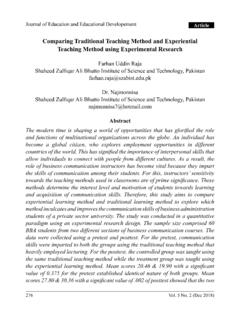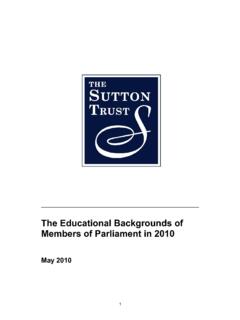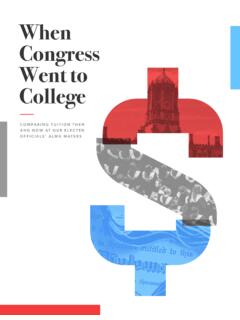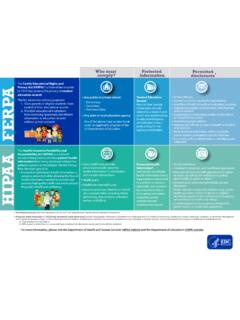Transcription of Comparison of different types of school - New Schools Network
1 Comparison of different types of school A guide to Schools in England January 2015 Growing Schools advice support ideas 2 Charity number: 1132122 Introduction There are an increasing number of different types of school in England, and it can be difficult to distinguish between them. The New Schools Network is an organisation geared towards helping you set up a free school , but what separates free Schools from academies and maintained Schools ? This document is designed to help you distinguish between the different kinds of Schools in England. The first section provides a brief outline of academies (of which free Schools are a type), maintained Schools , and other types of school .
2 The second section goes into further detail, comparing these different categories of Schools in such areas as curriculum, personnel management, admissions and finance. 3 Charity number: 1132122 Outline of different school types Academies While there are different types of academies in operation in England, they all have the same status in law as academies . Academies are publically funded, independent Schools , held accountable through a legally binding funding agreement . These Schools have more freedom and control over curriculum design, school hours and term dates, and staff pay and conditions. Free Schools , academy converters and traditional academies all have this status, yet there are a number of differences between them.
3 This is focussed on: Who sets them up; Why they are set up; Whether there is a predecessor school ; and What the provider has to demonstrate in order to be given permission to set one up. Free Schools What are they? New state Schools (which includes independent Schools becoming state Schools for the first time). Who sets them up? Teachers, parents, existing Schools , educational charities, universities, community groups. In order to do so, the group must form a company limited by guarantee and choose members and directors to run it. Free school companies must use the DfE model memorandum and articles of association, meaning that once constituted the company will be an academy trust.
4 How are they run? Free Schools are independent, free from local authority control. They are held accountable through a funding agreement - a contract with the Government. How do they get permission? Free Schools must submit an application to the Department for Education. They must demonstrate that there is a clear demand for that type of school from the parents in the area. Traditional academies What are they? Usually, they are underperforming existing Schools which are allocated to an academy sponsor who will take them over. Who sets them up? Academy sponsors can be universities, FE colleges, education charities and business sponsors. How are they run?
5 Traditional academies are independent, free from local authority control. They are held accountable through a funding agreement - a contract with the Government. How do they get permission? The Department for Education brokers between academy providers and the underperforming Schools . Academy converters What are they? Usually, they are high performing Schools already in existence, who opt out of Local Authority control to gain independence and autonomy. Who sets them up? They are existing state Schools . How are they run? The school governing body signs a funding agreement with the Government and are independent from the Local Authority. 4 Charity number: 1132122 How do they get permission?
6 Outstanding Schools apply to the Department for Education for approval. Maintained Schools While the number of academies in England is expanding, the majority of state Schools are maintained Schools . This means they are overseen, or maintained , by the Local Authority. These Schools must follow the national curriculum and national teacher pay and conditions. There are four main types of maintained Schools . Their differences are over: Who employs the staff; Who owns the land and buildings; and Who controls the admissions arrangements. Community Schools What are they? Schools which are controlled and run by the Local Authority. How are they run? The Local Authority employs the staff, owns the land and buildings and determines the admissions arrangements.
7 Foundation and trust Schools What are they? Schools run by their governing body. How are they run? The governing body employs the staff and sets its own admissions criteria. The land and buildings are usually owned by the governing body or, in trust Schools , a charity. Voluntary Aided Schools (VA Schools ) What are they? The majority of voluntary aided Schools are faith Schools . A foundation or trust (usually a religious organisation) inputs a small proportion of the capital costs for the school and forms a majority on the Schools governing body. How are they run? The governing body employs the staff and sets admissions criteria. The land and buildings are usually owned by the religious organisation.
8 Voluntary Controlled Schools (VC Schools ) What are they? VC Schools are like VA Schools , but are run by the local authority. How are they run? The local authority employs the staff and sets admissions. The foundation or trust (usually a religious organisation) owns the land and buildings, and usually forms a quarter of the governing body. 5 Charity number: 1132122 Other types of school While academies and maintained Schools form the majority of Schools in England, there are two other types of school that are different from the ones already discussed. They are different from academies and maintained Schools because of: How they are funded; and How they can select their pupils.
9 Grammar Schools What are they? State funded Schools which select their pupils on the basis of academic ability. Grammar Schools can also be maintained Schools . Independent Schools What are they? Schools that charge fees to attend, rather than being funded by the government, and can make a profit. They are governed and operated by the school itself. They are lightly regulated by government and inspected by a range of bodies. Who sets them up? Independent Schools vary from those set up by foundations in the middle-ages to those founded by new companies and charities. How are they run? They are funded by fees, gifts and endowments and are governed by an independently elected board of governors.
10 6 Charity number: 1132122 Differences between school types Between these school types there many detailed differences between free Schools and academies and the maintained sector. These centre around: The curriculum; The students; Finance; Personnel management; Governance; and Accountability. These differences are discussed in more detail in the table below. Free Schools Academies Maintained Independent Curriculum Content Exempt from following National Curriculum. Must teach certain subjects including maths, English and science. Must be broad and balanced in curriculum. Exempt from following National Curriculum Must teach certain subjects including maths, English and science.





